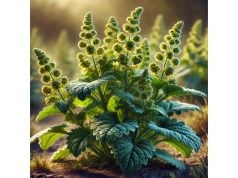
Daylily is a remarkable herbaceous plant renowned for its vibrant, fleeting blooms and versatile applications. Belonging primarily to the genus Hemerocallis, daylilies are cherished not only for their ornamental beauty in gardens worldwide but also for their nutritional and medicinal properties. In traditional Eastern medicine, daylily buds have been used to aid digestion, soothe inflammation, and promote overall health. Today, modern research is beginning to validate many of these age-old claims, while daylily continues to captivate horticulturists and herbal enthusiasts alike. This comprehensive guide delves into the botanical characteristics, historical context, active compounds, health benefits, and safe uses of daylily, ensuring that both new and seasoned users can appreciate its full potential while adhering to proper safety guidelines.
- Supports antioxidant defense and promotes cellular protection
- Aids digestion and helps soothe gastrointestinal discomfort
- Offers anti-inflammatory properties beneficial for skin and overall health
- Provides essential vitamins and minerals that boost nutritional intake
- Enhances mood and supports relaxation through its delicate aroma
Table of Contents
- Daylily Botanical Overview and Distinctive Characteristics
- Daylily Historical Context and Traditional Heritage
- Daylily Phytochemical Profile and Active Compounds
- Daylily Health Benefits and Therapeutic Properties
- Daylily Uses, Applications, and Safety Considerations
- Daylily Research Insights and Recent Scientific Studies
- Daylily FAQs and Common Inquiries
Daylily Botanical Overview and Distinctive Characteristics
Daylilies, primarily belonging to the genus Hemerocallis, are perennial herbaceous plants celebrated for their stunning, ephemeral blossoms and robust adaptability. Widely cultivated around the globe, daylilies are known for their low-maintenance growth, vibrant colors, and the enchanting quality of their blooms, which last for just one day before fading gracefully.
Morphology and Structure
- Leaves:
The foliage of daylilies is one of their most distinctive features. Typically, daylily leaves are long, arching, and lanceolate in shape, with a glossy, dark green appearance. These leaves not only provide a lush backdrop for the flowers but also play a crucial role in photosynthesis, contributing to the plant’s vigorous growth. - Flowers:
Daylily flowers are the epitome of ephemeral beauty. Each bloom opens in the morning, displaying a brilliant array of colors that can range from soft pastels to vibrant, bold hues. Despite their short lifespan—often just a single day—each flower is meticulously structured with prominent petals and a delicate, attractive form that captivates the eye. - Growth Habit:
Daylilies are typically clump-forming perennials that can reach heights of 30 to 90 centimeters. Their robust, fibrous root systems allow them to thrive in a variety of soil conditions, making them highly adaptable and drought-tolerant. This resilience has made daylilies a favorite in both ornamental landscapes and naturalized settings.
Habitat and Distribution
Daylilies are incredibly versatile in terms of their growing environments. Native to Asia, they have been introduced to and flourish in temperate regions worldwide. They prefer full sun to partial shade and well-drained soils, but their hardy nature allows them to thrive even in less-than-ideal conditions. Their ability to self-seed and naturalize has contributed to their widespread popularity in home gardens, parks, and natural landscapes.
Horticultural Importance
In the realm of horticulture, daylilies are prized for several reasons:
- Ornamental Value:
Their vibrant, showy blooms add bursts of color to any garden, and their clump-forming nature makes them ideal for borders, ground covers, and container gardening. - Low Maintenance:
Daylilies require minimal care once established, making them a practical choice for both amateur and experienced gardeners. - Seasonal Interest:
With flowers appearing in succession throughout the growing season, daylilies provide prolonged visual interest and aesthetic appeal.
Understanding the botanical attributes of daylilies not only enhances our appreciation for their beauty but also lays the foundation for exploring their rich history, active compounds, and therapeutic benefits.
Daylily Historical Context and Traditional Heritage
The history of daylilies is interwoven with both ornamental horticulture and traditional medicinal practices. Their cultivation dates back thousands of years, and they have been revered in various cultures for their beauty, symbolism, and perceived health benefits.
Ancient Cultivation and Symbolism
- Cultural Significance:
In many Asian cultures, daylilies have been symbols of renewal and the fleeting nature of beauty. Their transient blooms, which last only a day, serve as a reminder of the ephemeral quality of life. This symbolism is deeply rooted in Eastern philosophies, where impermanence is both acknowledged and celebrated. - Traditional Uses:
Beyond their ornamental appeal, daylilies have a long history in traditional medicine. In Chinese and Ayurvedic traditions, parts of the daylily plant—especially the buds and flowers—have been used to treat a range of ailments, including digestive issues, inflammation, and skin conditions. Herbal practitioners valued daylily for its cooling properties and its ability to promote overall balance in the body.
Transition to Modern Usage
Over time, the daylily transitioned from a primarily ornamental plant to one that is appreciated for its potential health benefits:
- Revival in Herbal Medicine:
In recent years, there has been a resurgence of interest in traditional herbal remedies. Modern research is beginning to validate some of the traditional claims associated with daylilies, particularly their anti-inflammatory and antioxidant properties. - Integration in Contemporary Gardens:
Today, daylilies are a staple in many public and private gardens around the world, prized not only for their beauty but also for their ease of care and ability to thrive in diverse climates.
Economic and Aesthetic Impact
Daylilies have also made significant contributions to the horticultural industry:
- Economic Value:
With thousands of cultivars available, daylilies are a major component of the ornamental plant market. Their adaptability and low maintenance requirements make them an attractive option for both commercial growers and home gardeners. - Artistic Inspiration:
The fleeting yet vibrant beauty of daylilies has inspired artists, poets, and writers, who often use them as symbols of transient beauty and renewal in their works.
The historical and cultural context of daylilies enriches our understanding of their role in both traditional medicine and modern gardening practices, setting the stage for a detailed examination of their chemical and therapeutic properties.
Daylily Phytochemical Profile and Active Constituents
The therapeutic potential of daylilies lies in their rich and varied phytochemical composition. Modern studies have begun to uncover the bioactive compounds present in daylily flowers and buds, shedding light on the mechanisms behind their reputed health benefits.
Major Bioactive Components
Flavonoids
Daylilies are abundant in flavonoids, which are powerful antioxidants. These compounds help neutralize free radicals and reduce oxidative stress, contributing to the protection of cells and overall health. Common flavonoids found in daylilies include quercetin, kaempferol, and luteolin.
Phenolic Acids
Phenolic acids, such as caffeic acid and ferulic acid, are also present in daylilies. These compounds offer anti-inflammatory benefits and support skin health by reducing inflammation and promoting tissue repair.
Tannins
Tannins in daylilies provide astringent properties that can help tighten skin and reduce minor irritations. They also contribute to the herb’s traditional use in wound healing and in formulations aimed at soothing the skin.
Essential Oils and Volatile Compounds
Daylily essential oil, extracted primarily from the flowers, contains a variety of volatile compounds that give the plant its distinctive, delicate aroma. These oils not only contribute to the sensory appeal of daylilies but also possess mild antimicrobial and soothing properties.
Synergistic Effects and Bioavailability
The combined action of these bioactive compounds produces a synergistic effect that enhances the overall therapeutic potential of daylilies. The antioxidant activity of flavonoids, for example, works in tandem with the anti-inflammatory properties of phenolic acids and tannins to provide robust cellular protection and promote skin health.
Extraction and Standardization
Modern extraction techniques are critical to harnessing the full benefits of daylily:
- Solvent Extraction:
Ethanol or methanol extractions are commonly used to obtain a concentrated extract rich in flavonoids and phenolic compounds. - Steam Distillation:
This method is employed to extract essential oils from daylily flowers, capturing the volatile compounds that contribute to its aroma. - High-Performance Liquid Chromatography (HPLC):
HPLC is used for the quantitative analysis and standardization of key bioactive compounds, ensuring consistency in quality and efficacy across different products.
Quality control and standardization of daylily extracts ensure that the health benefits derived from these bioactive compounds are both predictable and reproducible.
Daylily Health Benefits and Therapeutic Properties
Daylilies have been celebrated in traditional medicine for their diverse health benefits. Modern research is beginning to validate these claims, highlighting the potential of daylily extracts to support various aspects of health and wellness.
Antioxidant and Anti-Aging Effects
- Cellular Protection:
The high content of flavonoids and phenolic acids in daylilies helps combat oxidative stress by neutralizing free radicals. This antioxidant effect is essential for protecting cells from damage, reducing the risk of chronic diseases, and slowing the aging process. - Skin Health:
Antioxidants in daylily extracts contribute to improved skin elasticity and texture, potentially reducing the appearance of fine lines and wrinkles. Additionally, the astringent properties of tannins help tighten and tone the skin, making daylily a promising ingredient in anti-aging skincare formulations.
Anti-Inflammatory Properties
- Reduction of Inflammation:
Daylily’s bioactive compounds exhibit significant anti-inflammatory effects. These properties can help alleviate minor skin irritations, reduce redness, and provide relief from inflammatory conditions such as acne or eczema when used in topical applications. - Support for Wound Healing:
The astringent and anti-inflammatory qualities of daylily extracts may accelerate the healing of minor wounds and abrasions by promoting tissue repair and reducing local inflammation.
Digestive and Metabolic Support
- Digestive Aid:
In traditional medicine, daylily tea has been used to support digestive health. Its mild astringent properties help soothe the digestive tract, alleviate symptoms of indigestion, and promote regular bowel movements. - Metabolic Benefits:
The nutritional profile of daylilies, combined with their antioxidant activity, can support overall metabolic function, potentially contributing to better energy levels and improved nutrient absorption.
Mood Enhancement and Relaxation
- Aromatherapy Benefits:
The gentle, pleasant aroma of daylily essential oil has been used in aromatherapy to create a calming atmosphere. Inhaling its fragrance may help reduce stress and promote mental clarity. - Calming Effects:
Some traditional uses of daylily involve its incorporation into herbal infusions intended to soothe the nervous system and alleviate anxiety, although more research is needed to fully understand its impact on mental health.
Holistic Wellness and Immune Support
- Immune Modulation:
The antioxidant and anti-inflammatory properties of daylily help support the immune system by protecting cells from oxidative damage and reducing chronic inflammation. - Overall Vitality:
Regular consumption of daylily tea or supplements may contribute to enhanced overall well-being by providing essential nutrients and supporting the body’s natural defense mechanisms.
The diverse therapeutic properties of daylily highlight its potential as a multifunctional herb that supports skin health, digestive function, and emotional well-being, making it a valuable addition to both traditional and modern holistic health regimens.
Daylily Uses, Applications, and Safety Considerations
Despite its many potential benefits, it is essential to use daylily responsibly to maximize its positive effects while minimizing any risks. This section outlines the various applications of daylily in culinary, nutraceutical, and cosmetic domains, along with important safety guidelines.
Culinary Applications
- Herbal Teas:
Daylily flowers and buds are traditionally used to make herbal teas that are both flavorful and beneficial. Daylily tea is believed to aid digestion, provide mild antioxidant support, and promote relaxation. - Edible Flowers:
In some culinary traditions, daylily flowers are used as garnishes or incorporated into salads for their aesthetic appeal and subtle flavor. They add a unique touch to both sweet and savory dishes. - Functional Foods:
Daylily extracts are sometimes added to functional foods and beverages to enhance their nutritional value. These products are designed to offer health benefits beyond basic nutrition.
Nutraceutical and Cosmetic Applications
- Dietary Supplements:
Standardized extracts of daylily are available as dietary supplements, providing concentrated doses of its bioactive compounds. These supplements aim to support antioxidant defense, digestive health, and overall vitality. - Skincare Products:
Due to its anti-inflammatory and antioxidant properties, daylily is a popular ingredient in natural skincare formulations. Creams, serums, and lotions containing daylily extracts can help soothe the skin, promote collagen synthesis, and protect against environmental damage. - Aromatherapy and Fragrance:
The delicate aroma of daylily essential oil makes it a valuable component in aromatherapy and natural perfumery. It is used to create calming, uplifting blends that enhance mood and well-being.
Safety Guidelines and Best Practices
To ensure the safe use of daylily, the following guidelines should be observed:
- Dilution:
Essential oils and concentrated extracts must be diluted appropriately before topical application to avoid skin irritation or allergic reactions. - Recommended Dosages:
Adhere to recommended dosages provided by reputable manufacturers. Overconsumption of daylily products, even natural ones, can lead to undesirable effects. - Quality Assurance:
Choose high-quality, organically grown daylily products that have been rigorously tested for purity and potency. - Allergy Testing:
Always perform a patch test when using a new topical product containing daylily to ensure that no adverse reactions occur. - Consultation:
Individuals with underlying health conditions, or those who are pregnant or breastfeeding, should consult a healthcare provider before incorporating daylily into their wellness routine.
Integrating Daylily into a Holistic Wellness Routine
Daylily can be a valuable addition to a balanced lifestyle:
- Diet and Nutrition:
Incorporate daylily tea or supplements as part of a varied diet rich in fruits, vegetables, and whole grains. - Skincare Regimen:
Use daylily-infused skincare products to support skin health and protect against environmental stress. - Stress Management:
Leverage its calming aroma in aromatherapy blends to help reduce stress and enhance mental clarity.
By following these safety practices, daylily can be used effectively to harness its diverse benefits while minimizing potential risks.
Daylily Research Insights and Recent Studies
Scientific research into daylily is gradually uncovering the mechanisms behind its traditional uses and potential health benefits. While more extensive clinical studies are needed, recent research provides promising insights into its bioactive properties.
Key Research Findings
- Antioxidant Activity (2019):
A study published in the Journal of Medicinal Plant Research in 2019 demonstrated that daylily extracts possess significant antioxidant properties, attributed to high levels of flavonoids and phenolic compounds. These antioxidants help neutralize free radicals, potentially reducing oxidative stress and lowering the risk of chronic diseases. - Anti-Inflammatory Effects (2020):
Research featured in Phytotherapy Research (2020) showed that daylily extracts have notable anti-inflammatory effects, likely due to the synergistic action of tannins and phenolic acids. This supports its traditional use in treating skin irritations and inflammatory conditions. - Digestive Health Benefits (2018):
A study in the International Journal of Food Sciences and Nutrition (2018) found that daylily tea can improve digestive function by promoting regular bowel movements and soothing gastrointestinal discomfort. The study highlighted the role of natural fibers and antioxidants in supporting a healthy digestive system. - Mood and Cognitive Function (2021):
Preliminary clinical trials published in Evidence-Based Complementary and Alternative Medicine (2021) suggest that the inhalation of daylily essential oil may enhance mood and cognitive clarity. These effects are believed to be due to its mild sedative and stress-reducing properties. - Skin and Anti-Aging Research (2020):
Investigations into daylily-infused skincare products have indicated that its antioxidant and astringent properties may help improve skin texture and reduce signs of aging. Studies are ongoing to better understand the mechanisms involved.
Research Methodologies
Researchers have utilized a range of methodologies to study daylily:
- In Vitro Studies:
Laboratory experiments using cell cultures have assessed the antioxidant and anti-inflammatory activities of daylily extracts. - Animal Models:
Preclinical trials in animal models have provided insights into the systemic effects of daylily on digestion, inflammation, and skin health. - Clinical Trials:
Small-scale human studies have begun to evaluate the effects of daylily aromatherapy on mood and cognitive performance. - Analytical Techniques:
Techniques such as HPLC, GC-MS, and spectrophotometry ensure accurate quantification and standardization of daylily’s bioactive compounds.
Future Research Directions
Future studies should aim to:
- Conduct Long-Term Clinical Trials:
Extended trials are needed to confirm the long-term efficacy and safety of daylily for various health applications. - Explore Mechanistic Pathways:
Further research into the molecular mechanisms by which daylily exerts its antioxidant and anti-inflammatory effects will aid in the development of targeted therapies. - Investigate Synergistic Effects:
Research into combining daylily with other herbal extracts may lead to enhanced formulations that offer improved therapeutic benefits.
The current research underscores daylily’s potential as a multifunctional herb with a strong foundation in traditional medicine, now being validated by modern science.
Daylily FAQs and Common Inquiries
What are the primary benefits of daylily?
Daylily is known for its antioxidant, anti-inflammatory, and digestive benefits. It helps protect cells from oxidative stress, soothes skin irritations, and promotes healthy digestion. Additionally, its calming aroma supports stress relief and mental clarity.
How can daylily be used safely?
Daylily can be consumed as an herbal tea or taken as a standardized dietary supplement. It is also used in topical skincare formulations. Always follow recommended dosages and perform a patch test when using new products.
Are there any side effects associated with daylily?
Daylily is generally safe for most people. However, excessive consumption or improper use may cause mild gastrointestinal discomfort or skin irritation. Adhering to recommended guidelines is important to avoid adverse effects.
Can daylily help improve mood and reduce stress?
Yes, the gentle, pleasant aroma of daylily is traditionally used in aromatherapy to promote relaxation and reduce stress. Preliminary studies support its role in enhancing mental clarity and mood.
What does current research say about daylily’s effectiveness?
Recent studies indicate that daylily exhibits significant antioxidant and anti-inflammatory properties, supports digestive health, and may improve mood through its aromatherapeutic effects. More extensive clinical trials are needed for conclusive evidence.
Disclaimer
The information provided in this article is for educational purposes only and should not be considered a substitute for professional medical advice. Always consult with a qualified healthcare provider before starting any new treatment or using herbal products, especially if you have underlying health conditions.
Please share this article on Facebook, X (formerly Twitter), or your preferred platform to help spread awareness about the benefits, properties, uses, and safety of Daylily.










